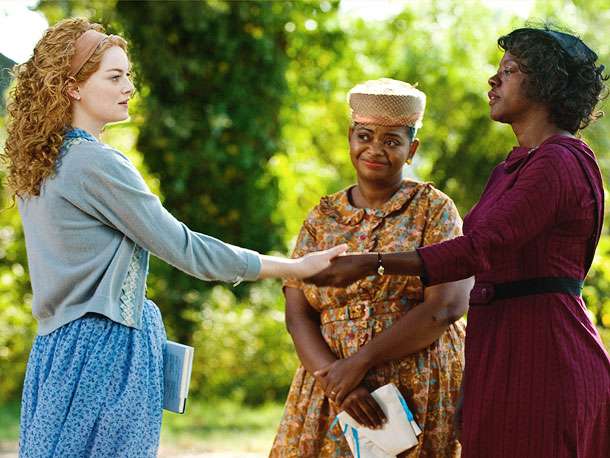Tate Taylor: THE HELP (2011)
Review by Chris Knipp
EMMA STONE, OCTAVIA SPENCER, AND VIOLA DAVIS IN THE HELP
Servant problems
The Help is a movie based on Kathryn Stockett's 2009 bestseller of the same name about black maids who tell all to a young white reporter in 1963-64 Jackson, Mississippi. Characters are exaggerated and events are implausible and the movie, doubtless like the book, pushes buttons on its way to a too-easy, tear-jerker finale. But Stockett's and director Tate Taylor's hearts seem to be in the right place. They make no bones about the mindless racism of the maids' spoiled, do-nothing young white mistresses, who were in the tender care of these same black women or these women's mothers as children. The movie, like the book, shows how brave and tough the black women were. This is a movie that is unsatisfactory in many ways, but also serves a worthwhile purpose in bringing the state of the Jim Crow South back into the spotlight for a popular audience that may have forgotten or never knew. This is a touching story of black empowerment that gives the Sixties civil rights movement in the South a human face. Taylor, though new to directing, is a seasoned actor and he has gotten terrific performances from his cast even though characters are overdrawn. Interesting question (which may not have troubled the filmmakers): How well will this play for African-Americans? Obvious irony: the young white women are also victims, dumbed-down by their superficial lives and the prevailing white ignorance. The Civil Rights Act is waiting to happen, and so is feminism. But these caricatured white women don't seem ready for either. Taylor's canny casting includes two distinguished older actresses, Cicily Tyson as an aging, wronged nanny, and Sissy Spacek as the worst white racist's mother, who transcends senility to see through her.
There are three heroines. The young white writer is Eugenia 'Skeeter' Phelan (Emma Stone), just back from college and full of journalistic and literary ambitions, a pretty Nicole Kidman-like tomboy who sets herself apart from all the silly, superficial young white women she grew up with. Skeeter bands together with two unusually independent black women, Aibileen Clark (Viola Davis), who now works in her family's house, and Minny Jackson (Octavia Spencer), whose outspokenness has joined her with Celia Foote (Jessica Chastain, of Tree of Life), married to a rich young man but rejected by the local social set for her poor-white origins and rumors of sexual misbehavior. Here is one place where the story's prevailing caricature works: Celia is a freestanding comic creation, as is her unexpected partner, Minny. Skeeter's plan of exposing the lives of black servants is blocked by the unwillingness of most to talk to her, until the civil rights climate and some local injustices turn them around. This movie has emphatic scenes of gatherings: abandoned toilets spread out on a white racist's lawn and people coming to gawk; the overdressed white women at their giddy social get-togethers; the maids crowding into Abileen's kitchen pledging to report to Skeeter. But the real focus is on individual action, and the surest winner is Skeeter, whose writing gets her out of the South and into the mainstream limelight.
The Help touches on very real situations, even though the sets and costumes have an excessive Hollywood gloss. The maids are paid below minimum wage, with no benefits. But worse, they are daily humiliated. The objective correlative of this is a campaign by one woman, the arch-villain, as it were, Hilly Holbrook (Bryce Dallas Howard), to require the black employees to use separate toilets outside the house when on the job. MInny gets back with a trick, and language, that the Sixties would hardly have permitted. The Help is wish fulfillment for its characters. The maids get all sorts of concrete revenge, or in the case of some of the white women, have saccharine changes of heart. It's also a triumphant fantasy for Kathryn Stockett, who is telling a wish-fulfillment story here of a young woman with no previous writing experience who writes a sensational bestseller (in the movie, it's seen only as rocking Jackson). In other words, Stockett recreates herself as Skeeter Phelan, the feel-good heroine. And though she herself grew up in Jackson, Mississippi, she sets her events in the Sixties to make it all more heroic and significant. Nothing is saved from tweaking. Skeeter's cancer-ridden mother, Charlotte (Allison Janney) gets well at the end so Skeeter can go off to a publishing job in New York with a clear conscience. She leaves behind a boyfriend (Chris Lowell) who admired her pluck, but turned on her when she got political. No matter: men don't count for much in this story at any point.
Taylor's movie version manages to escape some of the book's worst excesses, particularly its crude renderings of black dialect, which are toned down and become more convincing when spoken by the talented black cast. The pleasure is the acting. Despite running to well over two hours to tie off all its threads, the film is not so successful at setting the story in the wider political context, alluding briefly to the assassination of President Kennedy and the death of Medgar Evers but then forgetting larger events as it resolves its various local and personal subplots. Deep analysis is lacking: Skeeter asks Abileen what it feels like to raise a white child while your own child is at home being raised by somebody else, but the answer is long held in abeyance. The movie, vivid though it is, settles for feel-good entertainment and does not deeply explore the conflicts in white people whose black nannies are closer to them than their own mothers and then grow up expected to regard them as less than fully human.
The Help's US release date is August 10, 2011; France, September 2; the UK, October 28. 147 min.





 Reply With Quote
Reply With Quote
Bookmarks